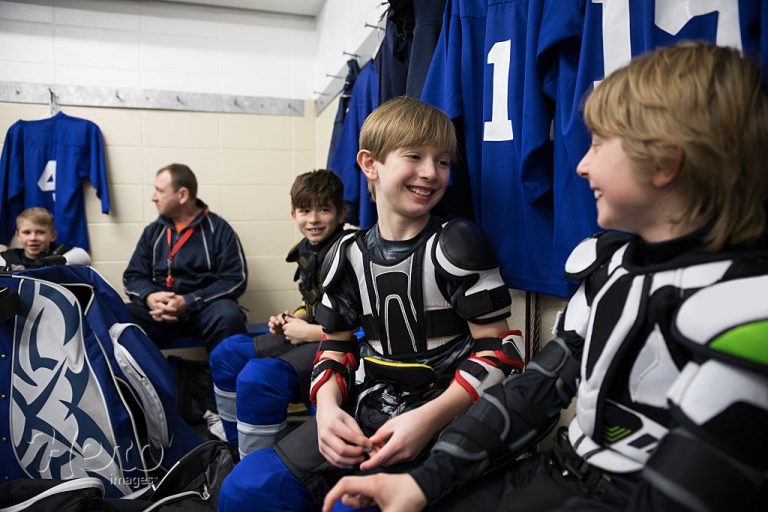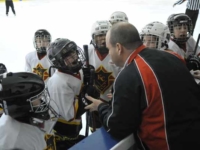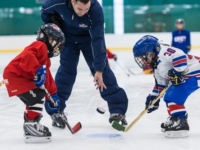When it comes to sports, skill is important, but it is not he only thing that matters in performance. Even the most skilled players will make mistakes and experience adversity, so it is important for them to remain confident about their abilities even when times get tough. Confidence is a vital trait among minor hockey players, whether or not they are among the top players in their league.
Even the less-skilled, gritty players need to show confidence in order to succeed in hockey. All players must enter every game with their heads up high, ready to perform to the best of their abilities. Without confidence, players tend to give up more easily and lose focus, so it is important for coaches and parents alike to provide an atmosphere that helps players grow in their confidence. Here are some ways to help increase confidence in hockey players.
Remain positive, no matter what
It should go without saying that positivity will lead to confidence, but many coaches and parents forget this in the heat of the moment. When a player makes a mistake, don’t berate him or her – focus on what they did well and offer advice on how they can build on that particular trait. Make sure that if you are offering criticism that it is constructive criticism and not just harping on the player because he made a mistake.
When you take a negative approach to criticism, the player may dwell on what he did wrong, trying to avoid that rather than focusing on what he can do differently. It’s better to congratulate the player for the things that went right during the game or the play than it is to continually bring up a mistake.
The positivity should shine through when giving advice as well. Instead of saying what can go wrong if a mistake is made, talk about what can go right when the problem is fixed. For example, great stick handling might lead to a breakaway that opens up a scoring opportunity. Focus on that instead of noting that being too flashy might result in a turnover. This will let the players know that you believe in them and will keep them optimistic about the future.
Foster a Supportive Environment
Positivity should be felt throughout the locker room, not just on an individual basis. Emphasize that this is a team effort and that every member of the club is expected to be positive towards each other. Young players may often show frustration in the heat of the moment, and sometimes it might be directed towards a mistake that another player made. Teach the children that it’s okay to be frustrated but that they must always support each other.
There’s nothing wrong with letting players critique each other’s techniques and in-game awareness, but just like with the coach, this should go in a positive direction. No young player wants to be an object of ridicule among his teammates. By removing negative language and criticism, you will be building a team of confident young hockey players that believe in each other and in themselves.
Give them independence
A hockey player should feel empowered to make their own decisions and play their own style of game. A coach is there to help them along, not to place restrictions and quotas on them. If a player feels like he is being watched too closely or constantly evaluated, he may lose his confidence and start pressing. This is stressful and will lead to mistakes both in practice and in games.
Players need guidance, but they also need to be themselves and let their personalities flourish. Young players are emotional and sometimes a little overzealous, but they are playing hockey to have fun and coaches and parents need to remember that. Allowing them to work independently can help them to become more confident in the long run. This doesn’t mean ignoring their needs or never offering advice, but you should give them the space that they may be requesting.
Show Confidence in Yourself
Nothing can quite drag a team down like a coach who shows a lack of confidence. Part of fostering that positive environment is having a positive attitude about yourself and your abilities as a coach. Your body language can say a lot, and if you begin to look as though you’ve been defeated, you’ll notice that the team is playing with less energy and a worse attitude.
Your actions have more of an impact on the team than you can imagine, so treat coaching or parenting as an opportunity to be a good, strong role model who believes in him/herself. Minor players, especially younger ones, are greatly influenced by the adults around them.
Be consistent
As a coach, you are ultimately in charge of what the team does as far as practicing and playing are concerned. It’s important to take your job seriously and be consistent and prepared with your practices and lessons. Some players need more time to get acclimated to certain drills or plays, and the more reps they get in, the better they will become.
Needless to say, improving a player’s skills and awareness will make him more confident over time. If you are providing honest, consistent, and positive feedback, there’s no limit to how much a player can improve. Not only will individual players be more confident, but the team around them will be as well, giving them more chances for success.
Remember it’s just a game
Kids shouldn’t be taking anything too seriously, especially a sport. They can be committed to their craft without feeling like the world is ending if they make a mistake. The more fun they are having and the more loosely they are playing, the more confident they will be. If they are nervous, wound up, or stressed, they will start to lose some of this confidence. The distractions of their own mind can be a major detriment to their development.






